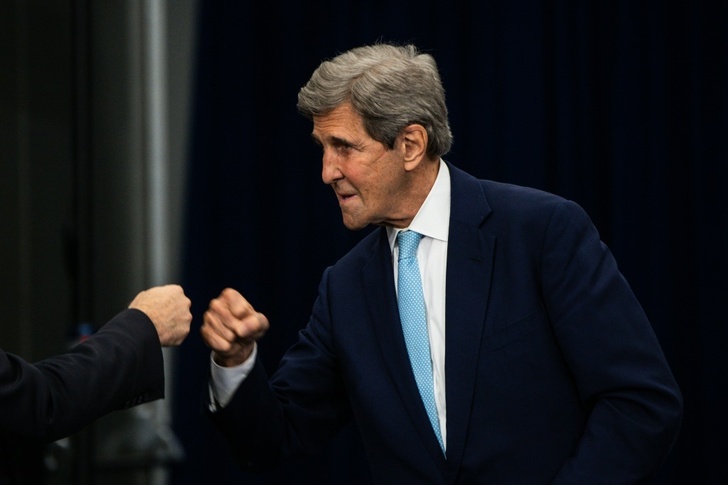Safeguarding the world's oceans will be fundamental to tackling global warming, US climate envoy John Kerry told AFP on Tuesday, warning that war in Ukraine and its economic fallout meant efforts to curb dangerous carbon pollution were facing "powerful headwinds".
The interview, on the margins of the UN Ocean Conference in Lisbon, has been edited for length.
Q. This meeting has no negotiating agenda. How will it feed into critical year-end summits on biodiversity and climate change?
You cannot solve the problem of the climate crisis without dealing with the ocean, which is a critical as a sink for carbon dioxide. And you can't solve the problems in the oceans without dealing with climate, because greenhouse gas emissions are acidifying and warming ocean waters.
We just discussed this at a high-level session with a cross-section of countries. Everybody was in complete agreement about the priority of the oceans being integrated into the Sharm el-Sheikh COP (the November UN climate summit in Egypt).
Whether it is the green shipping corridors initiative (for carbon-free shipping); the memorandum that President Biden signed today to combat illegal, unreported and unregulated fishing on the high seas; or setting aside 30 percent of nations' exclusive economic zones as protected areas -- every step of the way, there are linkages between the ocean and what we need to do on climate.
Q: Does the US support a call made here by the leaders of Palau and Fiji for a moratorium on deep sea mining for minerals used in making electric car batteries?
We haven't taken an official position on it. But we have expressed deep concerns about adequately researching the impacts of any deep-sea mining, and we have not approved any.
Q. Maritime shipping accounts for about three percent of global greenhouse gas emissions -- just over a billion tonnes of C02 -- per year. The International Maritime Organization (IMO) has set a goal of cutting those emissions 50 percent by 2050 from 2008 levels. Is that good enough?
No. We want zero-emissions for that sector no later than 2050. That includes compatible goals for 2030 and 2040 in order to reach that. The next months are critical.
Q. The war in Ukraine has seen an upsurge in shipping liquified natural gas (LNG). Is there not a danger of creating a temporary solution for energy that becomes a permanent problem for climate?
It depends what rules are established for the transition. We are not in favour of building out 20-, 30- and 40-year LNG infrastructure without it being green-hydrogen ready, ammonia ready. You have to stay on a track to hit net-zero by 2050. That includes gas. So we're going to have to be able to capture carbon and store or utilise it.
Preparing for the G7 summit (June 26-28 in Germany), I just viewed language (of the draft communique) that specifically says any replacement gas for Russia has to stay within the bounds of the climate goals accepted in Glasgow and Paris. Nobody is talking about stepping outside of that.
Ukraine is not an excuse to suddenly turn away and not adhere to the promises made. If we do not reduce enough between 2020 and 2030, you cannot reach net zero by 2050 –- it's just that simple.
Q. A minister from a Caribbean nation -- whose portfolio includes managing subsidies -- told me this morning that in a period of inflation and recession, climate priorities come last. Are we headed for rough weather?
Yes. There are very powerful headwinds right now. But we have to keep our eye on the ball. If the economic transition gets the investment it needs -– and that’s what we're working on -- there will be a huge number of jobs, supply chains will improve, and inflation can come down.
The climate crisis is not going away. If you think it's expensive today to deal with climate wait until we see tens of millions of people who have to move from somewhere because of the extreme heat, or the breadbasket of a particular country has completely imploded as a result of drought.
None of this is going to get easier. Damage from the climate crisis is going to now grow for literally centuries. That's the predicament we have already put ourselves in by not facing up to the need for clean energy.
mh/klm/cdw
© Agence France-Presse
Your content is great. However, if any of the content contained herein violates any rights of yours, including those of copyright, please contact us immediately by e-mail at media[@]kissrpr.com.
Source: Story.KISSPR.com

